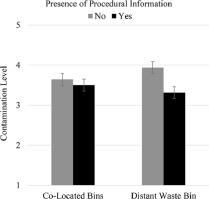Resources, Conservation and Recycling ( IF 13.2 ) Pub Date : 2021-01-29 , DOI: 10.1016/j.resconrec.2021.105430 Sonny Rosenthal , Noah Linder

|
This between-subjects experiment manipulated the proximity of a waste bin relative to a recycling bin and the presence of information about why and how to rinse recyclables. After completing a yogurt taste test, 272 undergraduate students disposed of their plastic tasting cups in either a waste bin or a recycling bin. Binary logistic regression showed use of the recycling bin roughly tripled when the waste bin was made less convenient by moving it away from the tasting area (p < .001, Nagelkerke R2 = 0.54). Univariate ANOVA showed the contamination level of recycled items was lower when an informational prompt indicated how clean recyclables need to be (p < .001, η2p = 0.08), but not when it indicated why rinsing is important. These findings showcase how manipulating the physical environment can be a powerful tool to steer behavior and how tailored information can complement physical changes to promote proenvironmental actions.
中文翻译:

垃圾箱接近度和信息提示对回收和污染的影响
该对象间实验控制了垃圾箱相对于回收箱的接近程度以及是否以及如何冲洗可回收物的信息。完成酸奶口味测试后,有272名本科生将其塑料品尝杯放在废物箱或回收箱中。二元逻辑回归分析表明,通过将废物箱移离品酒区而变得不太方便时,回收箱的使用率大约增加了三倍(p <.001,Nagelkerke R 2 = 0.54)。单因素ANOVA显示出回收物品的污染程度较低时一个信息提示指示的可回收如何清洁需要是(p <0.001,η 2 p = 0.08),但不是在表明冲洗重要的原因时则不然。这些发现表明,如何控制物理环境可以成为控制行为的有力工具,以及量身定制的信息如何可以补充物理变化以促进环保行动。



























 京公网安备 11010802027423号
京公网安备 11010802027423号